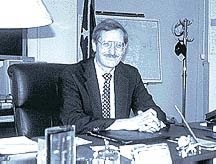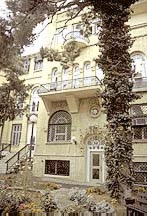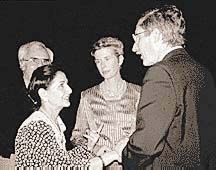|

Autumn 1995 (3.4)
Pages 48-49, 90
Diplomatic Interview
American Embassy
Richard
Kauzlarich
Interview by Betty Blair
The following interview
with Azerbaijan International's Editor, Betty Blair, took place
in the U.S. Embassy in Baku on September 29, 1995. It was ten
days before the announcement for dual pipeline routes through
Georgia and Russia for "early oil" by SOCAR (State
Oil Company of Azerbaijan Republic) and AIOC (Azerbaijan International
Operating Company), and six weeks prior to Azerbaijan's elections
for Parliament.
What path has brought you
to Azerbaijan?
Early on in the Clinton
Administration, I worked with Strobe Talbott, who was then Ambassador-at-Large
of the Newly Independent States (NIS) (Talbott is now No. 2 in
the State Department as Deputy Secretary). When Dick Miles, the
first U.S. Ambassador to Azerbaijan, moved to Moscow, I was asked
to come here.
I'm not a Soviet specialist, neither academically nor by career
path although while serving as Deputy Assistant Secretary in
the European Bureau and working for Strobe, I did work on the
NIS states and specifically the Caucasus. During the past 28
years, I've worked abroad in Togo, Ethiopia and Israel. Nothing
specifically prepared me for Azerbaijan except that I've spent
most of my professional life working on economic issues, though
not in petroleum. I've learned a lot from the people of SOCAR
(State Oil Company of Azerbaijan Republic) who have been in the
business for years and I've learned a lot from the American foreign
oil companies.
  Left: U.S. Ambassador Richard Kauzlarich Left: U.S. Ambassador Richard Kauzlarich
Azerbaijanis are getting ready to ratify their first Constitution
since independence and to elect a new parliament. What are your
concerns about the upcoming elections (November 12th)?
We've taken a very deep interest
in the electoral process and the movement toward democracy. All
over the world, American Embassies and Ambassadors try to promote
the observance of human rights movement toward democracy. Sometimes
that task is like hitting your head against a brick wall because
the problems are so great and resistance from the government,
so strong. It's not that way in Azerbaijan.
Politically, it's been difficult here since independence with
so many changes in the Presidency and the internal political
disorder some of which is related to the war. All these challenges
have made it difficult for the government to think about democratic
systems and processes.
In the end, it's the Azeris who have to decide what kind of government-what
form of democracy-they're going to have. It's important for Azerbaijan
to have an image in the world not just as a potentially wealthy
country with lots of oil but as a democracy which is moving in
a direction different than many of its NIS neighbors where democracy
is having a tough time.
Section 907 (Freedom Support Act which denies all aid to the
Azerbaijan government) is a problem for us at the U.S. Embassy
in our efforts to promote democracy. We have helped the government
prepare for elections in other places but our own Congress has
written laws that, in reality, are prohibiting us from doing
that here.
How do you mean? How can
U.S. policy hinder the American Embassy from promoting democracy
in Azerbaijan?
Take voter education.
Simply helping establish the Central Electoral Commission to
prepare better for elections. We can't do that here because the
Commission is part of the Azerbaijan government. We do have people
from the National Democratic Institute (NDI) and International
Foundation of Electoral Support (IFES) looking at ways we can
support the electoral system within the restraints of "907".
We're also looking for ways to help media get the word out about
the elections, about the candidates. But we can't get involved
with the normal television media because it's run by the Azerbaijan
government.
We're supporting the UN and the OSCE effort to set up a monitoring
office both for the elections themselves and for preparatory
work. The events leading up to elections are even more important
than November 12th itself. We're especially concerned that opposition
candidates are allowed to campaign and have access to media.
And it's important that observers, both foreign and domestic,
be allowed to observe the process leading up to elections.
There are those who believe that the U.S. is interested in supporting
particular parties and candidates. I have made the point in press
conferences and meetings with political leaders here that we
have no interest in any particular party or any particular candidate.
But we do have a very deep and abiding interest in the process
that leads to that decision-making process by the people of Azerbaijan.
The process must be as democratic as possible.
And so when the State Department raised questions on August 7th
about the registration of political parties, we did it because
many political parties, including the Popular Front, were not
being allowed to register. Since then, the government has registered
many more. Not all. We think this is a good beginning. It's not
the end of the story. There still is a problem with press censorship,
though in recent weeks censorship seems to be less. I think there
are still obstacles to candidates being able to get their views
across.
We'll be watching how television coverage works out. It's such
a powerful media here. People watch television who wouldn't necessarily
read newspapers. You can even see television antennas sticking
up above some of the tents in refugee camps.
A free and fair election is a complex process. I keep telling
people here, "Please don't believe that the job of democracy
in Azerbaijan is going to end on November 12th. In our own country,
we are never satisfied. It is a never-ending battle. You have
to work at it continuously. You never achieve perfect results.
Let's talk a bit more about "907" (the clause which
restricts U.S. foreign aid to the Azerbaijan government under
the "Freedom Support Act"). U.S. companies represent
the majority of investors (and beneficiaries) in oil projects
here but U.S. foreign policy denies all aid that could facilitate
the path to a market economy.
Section "907" makes my job much more difficult. It's
a serious problem because America is not perceived as an honest
broker in regard to Nagorno-Karabakh. From an Azeri perspective,
the U.S. legislation is morally wrong as it does not reflect
current political reality. Azerbaijanis have lost 20% of their
territory to Armenians. They have about a million refugees that
have been displaced from their homes, jobs, and communities.
So they view this legislation as a contradiction of principles.
The "907" disallows any government-to-government assistance
until the U.S. President determines that Azerbaijan has taken
demonstrable steps to "achieve peace and to lift economic
blockades" against Armenia.
The "achieve peace" portion has been achieved by the
cease-fire which has been in place over a year and a half. But
there has been no progress in lifting blockades which, by law,
must happen.
But there are two blockades.
What about the second blockade that Armenians have created against
Azerbaijan? [The southern rail route that connects Azerbaijan
to Nakhchivan (the non-contiguous Autonomous Republic of Azerbaijan)
by a 46 kilometer strip of territory belonging to Armenia].
We are dealing with
quite a different situation now since Azerbaijan, at this point,
does not control all its borders with Armenia. Azeris make a
strong case that they can't lift blockades when guns are still
pointed at them and that they don't control their own borders.
The U.S. interests in Azerbaijan are different and broader today
than when "907" went into effect in 1992. But that
does not change the reality of the legislation. Whether we like
it or not (the Clinton Administration as well as the Bush Administration
opposed it), it is the law of our land. As Ambassador, therefore,
I have to (1) do what I can within its framework to provide humanitarian
assistance through private volunteer organizations and (2) determine
where we can work with Azerbaijanis to meet their needs without
running into problems about "907". I think we've been
fairly successful.
How is that?
First of all, we've
provided over $70M worth of assistance since 1992 to the people
of Azerbaijan, through voluntary organizations-CARE, American
Red Cross, Relief International, World Vision, International
Rescue Committee, and Adventist Development and Relief Agency
(ADRA). All of these non-governmental agencies have been directing
money, food and medicine that the United States has provided
to displaced people directly living in refugee camps and along
side of roads (not via the Azerbaijani government).
  Left: The U.S. Embassy in Baku is a three-story complex
which was remodeled this past year (1994). One of the most popular
sections for Azerbaijanis is the library which offers a good
selection of current periodicals and books in English. Left: The U.S. Embassy in Baku is a three-story complex
which was remodeled this past year (1994). One of the most popular
sections for Azerbaijanis is the library which offers a good
selection of current periodicals and books in English.
Yes, but Armenia has received
$445 million during that same period. And Armenia's population
is half that of Azerbaijan's and one of the smallest of the former
Soviet Republics (about 3.5 million) Per capita, Armenians have
received more than $130 per person while Azerbaijanis have received
only $8. Even Russians only receive $15 per person. Armenia has
positioned itself behind Israel as the second largest recipient
of U.S. foreign aid.
Personally, I can't
do anything about that. Countries, with or without a war between
them, with or without a "907", will never be treated
exactly identical. The fact of the matter is, even with "907"
in place, we are able to do a lot of things. Not as much as I
would like, not as much as we should. But we have been able to
accomplish a lot.
The problem is a troublesome psychological problem for us at
the Embassy because it creates an environment that makes it difficult
for us to work as effectively as we might especially in two critical
areas-bringing peace and building democracy.
We are not seen as reflecting the morals that we say America
stands for-justice, fairness, democratic principles. From taxi
drivers to the President, we're told "This is not fair.
Democratic countries should not adopt such biased legislation.
Why aren't you branding Armenia as the aggressor? They're occupying
20% of our territory."
Simply, we're perceived as pro-Armenian? That's the view. That's
what I hear. That's what visitors hear. That's the Azeri perception.
Does "907" have
to be voted upon by Congress or could the President lift the
ban on aid to Azerbaijan?
If the blockades were
lifted, the President could determine under his own power that
the conditions had been met. He could then go to Congress. But
it's Congress that has to change the law.
But even if the blockades
were lifted today, there's a lot of physical damage to the railways
that would have to be repaired before the trains could run and
supplies start to go through again either to Armenia or Nakhchivan.
Certainly. Lifting the
blockades is not like turning on tap water. It's very complex.
You have to repair the structure. You have to find willing buyers
and sellers. You have to find the money to purchase things. That's
the practical side of all this. But it is something that will
have to be done sooner or later if there is peace. So why not
think about it now and work towards it.
How else is the U.S. reaching
out to the Azerbaijani community?
On the education side,
USIS (United States Information Service) has been able to sponsor
three Fulbright scholars at private universities here.
Three Fulbright scholars
between the period of 1992-1995? That's not very many.
No, it's not. But it's
something. And there have been Azeri high school students under
the Bradley Exchange Program who have gone to the U.S. We've
had from 35 to 50 students for each of the past three years go
live with American families for a year. This program may not
get a lot of attention in the U.S. or even here in Azerbaijan
but the potential for changing attitudes about what life is like
in America is incredible. You could spend millions and millions
of dollars to have the same impact. Students come back with a
much broader world view.
When it comes to health and medicine, the Embassy is very limited
because the health structure here is governmental (like every
place in the former Soviet Union). So, by law, we can only operate
through the voluntary (non-governmental) organizations.
A Junior Achievement Program will be piloted here starting in
November. Basically, it will be a way of teaching Azerbaijani
high school and college students how a modern economy and businesses
operate at a time when privatization and economic reform are
just beginning. I know these are all small-ticket items, but
I think taken together, they reflect a commitment and desire
on the part of the United States to do what we can.
What about cultural exchanges?
Privately, I guess my
wife is an important cultural exchange component of U.S. involvement
through her work with the "Friends of Azerbaijani Culture".
  Left: U.S. Ambassador and Mrs. Kauzlarich
with National Ballet Theater officials. Left: U.S. Ambassador and Mrs. Kauzlarich
with National Ballet Theater officials.
She's trying to help organize
a structure that can continue even after you have to move on
after another year to a new assignment.
Azerbaijan has a wonderful
cultural infrastructure that has developed over the years. Because
of the breakup of the Soviet Union, suddenly you have to pay
performers, artists and teachers real wages. This has become
very expensive. How do you avoid losing artists and musicians
which are clearly part of the national heritage? Back in the
19th century when the United States started to make its transition
into a modern industrial economy, people took it upon themselves
to support libraries and symphonies and art galleries out of
a sense of responsibility. We hope it will happen in Azerbaijan
as well.
There is a deep-rooted tradition
here which began with Oil Barons at the turn of the century.
It was considered honorable in society to be known as a philanthropist.
If Azerbaijanis can
create that spirit again during this transition, there will come
a time when there is more wealth for cultural, educational and
health care than there is today. I wish more American artists
and musicians could come here. Through USIS, we've had three
terrific, young enthusiastic musicians give concerts. Their performances
were mesmerizing. You've been to concerts here before-they're
usually a bit noisy but when these Americans performed, you could
have heard a pin drop.
America represents something special to Azerbaijanis. Now with
the break-up of the Soviet Union, there are great expectations,
perhaps even unreasonable, about the U.S. and what it can do
if it just puts its mind to it any place in the world. But part
of this affinity for the U.S. is shaped by the influence of American
music, especially during the Soviet period. Many people tell
you they grew up listening to American jazz secretly on the Voice
of America.
Despite all the difficulties Azerbaijanis have with perceiving
the U.S. government as pro-Armenian, they hold a great deal of
fondness for American music and for American English among other
things. We can point to all the problems that make it more difficult
for us to operate here. But fundamentally, there is a reservoir
of good will towards us that I don't believe we have begun to
tap. Azerbaijanis have genuine warm feelings towards Americans.
That attitude, I believe, is only growing now that the oil companies
are here and the Azeri students are coming back from exchange
programs.
What can you tell me in regard
to U.S. policy and the pipeline? AIOC (Azerbaijan International
Operating company) will be announcing their decision for the
pipeline route on October 10th. I hear that the U.S. is quite
involved with influencing the direction of the pipeline.
The decision, fundamentally,
has to be made by the companies which are partners in the Consortium.
It is the decision that effectively will determine how their
initial "early oil" gets to market. They'll have to
make some very hard economic decisions, looking at both routes
(Russian and Georgian).
Our view has been, all along, that the entire Caspian Basin must
be viewed as a region. The oil wealth must not be considered
in terms of only one country but of several. Over a period of
time, you'll need multiple pipelines. You won't be able to take
all of that oil and run it through a single pipeline. Even if
you had the flattest, safest, most direct route, you wouldn't
want to do that. You couldn't do that. So we would be pleased
with a solution that would end up with multiple pipelines. Everybody
will be better off. We have to be sensitive to the broader implications.
What would have to happen
for Iran to become a viable option for a pipeline route someday?
Iran is not a viable
option.
That's only the United States'
point of view.
I think there would
need to be serious fundamental changes in the way the Iranian
government relates to the rest of the world, especially in terms
of terrorism.
Congress does not allow economic relations with Iran and that
includes American oil companies. So any loans from the World
Bank or the EBRD (European Bank for Reconstruction and Development)
can't pass if they involve Iran.
A lot has had to happen in
the last three years to establish the Embassy here
I think Americans need
to understand how hard it is, not only in this country, but most
of the CIS (Commonwealth of Independent States), for the United
States to represent American interests and do everything that
the American people expect. We've been lucky to find such a fine
building. In the beginning we were living and working out of
one of the hotels under difficult circumstances.
Fortunately, we had a group of men and women who were pioneers
in every sense of the word. Now we all live in apartments that
are no different than the average Azeri apartment with all the
problems that the average Azeri suffers. Lack of water. Lack
of electricity. Poor telephone service.
And yet we're here, trying to reach out to the Azeri people through
our programs and trying to run assistance programs for refugees
through non-government organizations. We're trying to support
American companies whether they are large oil companies or the
smallest investor, who has only a glimmer of an idea how they
might get involved in Azerbaijan. We're here protecting American
citizens, issuing visas-all of these things. You can drive by
the American Embassy in London or Paris and take all these things
for granted. But you shouldn't here. It has taken a great effort
to get this all organized.
People need to understand that the American taxpayers are "getting
a real bang for their bucks." Our budget is under $2 million.
We're fourteen Americans with about 60 Azeri staff including
30 guards. So it's a busy place.
And everybody is working under difficult circumstances. People
come out here, in some cases with young families, without adequate
medical care, without easy connection to friends and families
in the US, and yet they're doing their job. Before the British
Airways or Lufthansa flights started last year, it used to take
a month just to get mail.
I've personally appreciated
the effort that you and your wife, Anne, have made to learn the
Azerbaijani language, especially since it's only spoken primarily
here and by Azerbaijanis in Iran (25+ million). You're deeply
respected in the community for this. I know you've made a big
effort.
Not as much as my wife
has. We try to put aside an hour a day together to be tutored
in Azerbaijani (we're not always successful). Anne has the aptitude
and the ability to go out and use it regularly. She's become
quite good at it. And quite a few of our staff members speak
either Azeri or Russian.
  Left: New Ballet Slippers for the National Ballet for
the new season provided by Azerbaijan FRIENDS of Culture (Azerbaijan
Madaniyyatinin Dostlari), an organization spearheaded by Anne
Kauzlarich, wife of the Ambassador, (2nd row in blue). September
1995. Many foreign companies have now started to support this
organization to assist arts during this difficult economic transition. Left: New Ballet Slippers for the National Ballet for
the new season provided by Azerbaijan FRIENDS of Culture (Azerbaijan
Madaniyyatinin Dostlari), an organization spearheaded by Anne
Kauzlarich, wife of the Ambassador, (2nd row in blue). September
1995. Many foreign companies have now started to support this
organization to assist arts during this difficult economic transition.
Generally, U.S. policy doesn't
put so much focus on languages, does it?
You're right. A lot
of this is personal. Before me, Dick Miles (now in Moscow) knew
Russian, and Robert Finn (now in Zagreb) had a Ph.D. in Turkish
literature. We've tried to stress the importance of people speaking
Azerbaijani when they arrive.
Why is that?
Simply, it's the language
of Azerbaijan. We need Russian, too. We think it's important,
to have people who are competent in both languages, especially,
for the immediate future. We see language as a dynamic, fluid
situation. Who knows what the future will bring? Who knows how
widespread Azerbaijani will become in the society? Who knows
whether Russian will remain a strong second language or whether
another language will take its place (like English)?
Even now when we begin recruiting to replace personnel at the
Embassy, we have to anticipate two years in advance so they can
get language training for a year. We're grooming people now,
trying to make sure we keep this mixture of Azerbaijani and Russian.
We've found, for example, that in the Visa section, Russian seems
to be more useful at this time. But, who knows, in a couple years,
this might all change.
From Azerbaijan International
(3.4)
Winter 1995.
© Azerbaijan International 1995. All rights reserved.
Back to Index
AI 3.4 (Winter 1995)
AI Home |
Magazine
Choice
| Topics
| Store
| Contact
us
|




